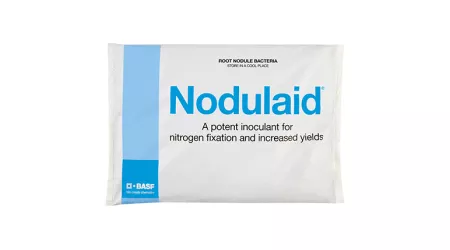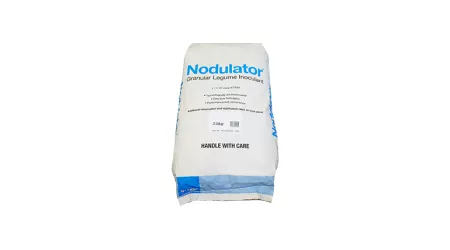The latest Australian Bureau of Agricultural and Resource Economics and Sciences (ABARES) Report celebrated another record year with the value of agricultural production set to reach $90 billion.
Past reforms, investments in productivity and industry responses to domestic and global pressures placed the agribusiness sector in a strong position to take advantage of record rainfall, historically high global commodity prices and manage the uncertainties created by the pandemic.
At BASF we remain committed to supporting farmers perform the biggest job on earth to channel industry opportunities and tackle challenges head on.
This year marks an important milestone in our history of supporting farmers with our agricultural solutions that lead the industry in quality and performance. We are celebrating our 75th year of manufacturing Nodulaid – our nation’s most trusted inoculant – made in Australia, for Australian farmers.
Nodulaid is produced at our Somersby plant on the New South Wales Central Coast, alongside our granular inoculant Nodulator. With expansion to the Somersby facility in 2019, BASF is dedicated to preserving local production that meets local demand.
BASF's Head of Agriculture for Australia & New Zealand, Gavin Jackson said: “We identified that customer demand for these types of inoculant products is rapidly growing and this was a key reason for our expansion and improved operations at Somersby in 2019. We have been focused on continually innovating and elevating our products to improve outcomes for Australian growers.”
The benefits of inoculating legumes and pulse crops with rhizobia (soil bacteria that fixes nitrogen) have been recognised for more than a century and have become an essential step in farming practices to ensure future crop health.
Of all farming inputs, inoculants also provide some of the best value for money. Nodulaid, for a few dollars per hectare, can deliver substantial yield gains and residual nitrogen for soil health worth hundreds of dollars per hectare. Inoculation can increase legume nodulation, grain and biomass yield, nitrogen fixation and post-crop soil nitrate levels.
Essentially, all the nitrogen (N) fixed by the rhizobia is exported out of the nodules on legume roots and used in legume growth. In a symbiotic relationship, the plant provides the rhizobia with habitat, nutrients and energy. Eventually, when the legume is harvested, the nodule breaks down and its rhizobia content is released back into the soil.
Moreover, the Australian Inoculants Research Group (AIRG) estimates that past and present use of inoculants saves Australian farmers about $4 billion every year. That is the difference between allowing nodulation to fix atmospheric nitrogen in the soil biologically and having to buy and apply the equivalent amount of nitrogen fertiliser.
Dennis Baker, a pulse grower from Donald in the Wimmera Mallee region of Victoria says inoculant application is vital for farmers to secure higher yields and improve soil health.
“It is a no brainer. You have got to put inoculant on. You have only got to pull the plants up if you have not inoculated, you can see it (the difference in root nodule size) side by side,” said Mr Baker.
“I have been using it for 20 years. I use inoculants on every pulse crop I grow. In 2021 my wheat paddock yielded well and went 4.2 tonne the year after chickpea was grown. Chickpeas usually dry the paddock, so it was a great result and I definitely recommend Nodulator.”
BASF inoculants are manufactured to the highest standards and tested throughout the production process to eliminate all risk of contamination and ensure they exceed the industry standard for levels of active rhizobia selected for Australian conditions.
Each year BASF receives the latest strains of the rhizobia bacteria cultured by AIRG which are re-tested in its own local laboratory before being added to the inoculant mix.
The inoculant products are then paired with the specific crop in which they are most effective to ensure reliable performance every year – much like how scientists and medical professionals adapt the influenza vaccine year-on-year to maintain resilience against virus mutation.
It is time for Australian farmers who are in the biggest job on earth to harness the power of inoculants that suits their agricultural needs and brings higher yields today. Cheers to 75 years of Nodulaid supporting Australian farmers sustain soil health year on year.


